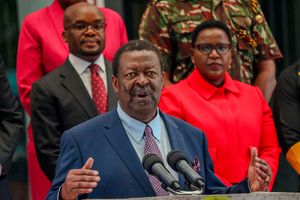
Head of Public Service Felix Koskei.
A storm is brewing over a new Bill that seeks to transfer the role of hiring civil servants from the Public Service Commission (PSC) to the head of public service.
In an internal report on the implications of the proposed law, the PSC alleges a plot to cripple independent bodies.
The Cabinet on March 11, 2025, approved the Public Service Human Resource Management and Development Bill, 2024, but the PSC has declared the Bill unconstitutional and an attempt to usurp its mandate through the backdoor.
The report exclusively obtained by Nation was prepared by the commission’s legal team and presented before a full session of its board.
It warns that the proposed law also encroaches on the mandates of county public service boards, the Judicial Service Commission (JSC), National Police Service Commission (NPSC), Parliamentary Service Commission (PSC), Teachers Service Commission (TSC) as well as constitutional commissions and independent offices.
The Bill by the immediate former Public Service Cabinet Secretary Justin Muturi has proposed creation of a Central Human Resource Management Posting Committee to be in charge of hiring and deployment of senior officers in the public service, a role currently done by the PSC.
Composition of the committee
The committee will be chaired by the Head of Public Service – presently Felix Koskei – and will have Principal Secretaries in charge of Public Service, Internal Security, Labour, Foreign Affairs, National Treasury and chief executive officer of PSC.
“The committee shall be responsible for the deployment of officers in the prescribed civil service grades in the public service. The ministry responsible for matters relating to public service shall provide secretarial services to the committee,” states the Bill.
The Bill, in its memorandum of objects and reasons, states that “the principal object of the bill is to provide an overarching framework for the effective management and development of human resources in the public service at both the national and county levels of government.”
“The bill seeks to enhance professionalism, standardisation and efficiency in public service delivery by codifying the roles, responsibilities and functions of various public offices and committees involved in human resource management and development.”
It further proposes creation of a Human Resource Management Advisory Committee, Human Resource Development Committee and an Employee Performance Management Committee.
The bill hands the Human Resource Management Advisory Committee the role of making recommendations for recruitment, selection, appointment, promotions, confirmation in appointment and deployment of officers.
But in the document, PSC under the chairmanship of Amb Anthony Muchiri, notes that the proposed bill seeks to take away its constitutional mandate through the backdoor.
The commission notes that if approved, the bill will essentially hand over major roles of the commission to the Ministry of Public Service and the various committees it seeks to establish.
The document notes that the only function of the commission that the bill does not interfere with is that of hearing and determination of appeals arising from county governments’ public service.
“As can be seen from the schedule of analysis, the proposed Bill intends to usurp the entire constitutional powers and functions of the commission save for the hearing and determination of appeals arising from county governments' public service,” warns the report.
“It is noteworthy that the proposed legislation has changed in a number of clauses from the initial draft that the commission had raised concerns about in October 2024. Specifically, the legislative proposal no longer contains the provisions in the initial draft that gave powers to the Head of Public Service. The current legislative proposal, however, still gives the Head of Public Service the power to chair the Central Human Resource Postings Committee without reference to the commission,” notes the report by PSC.
The report describes the proposed bill as an attempt to make national and county governments one service with the ministry as the central employer, terming it as an affront on devolution.
“The constitution provides for the national government and each county government as separate employers. The proposal seeks to usurp the functions and powers of the PSC and the individual County Public Service Boards (CPSBs) and County Assembly Service Boards (CASBs).”
PSC has questioned the motive of the bill, observing that the constitution already provides for the functions and powers of the various organs responsible for the management of human resources in the public service.
Article 234 of the constitution lists appointments in the civil service and establishment as some of the roles of the PSC.
“The Commission shall-- subject to this Constitution and legislation–– establish and abolish offices in the public service; and appoint persons to hold or act in those offices, and to confirm appointments, exercise disciplinary control over and remove persons holding or acting in those offices; promote the values and principles referred to in Articles 10 and 232 throughout the public service,” states the Article.
Exclusive mandate
PSC in the document states that the responsibility of developing human resource in the national government public service is the “exclusive mandate of the commission and is elaborately provided for in the PSC Act and regulations.”
“The provision in the proposed bill is a violation of the constitution and in conflict with the PSC Act and regulations. Considering the definition of ‘public service’, this provision also amounts to encroachment on the mandates of the other service commissions and county public service boards (CPSBs), County Assembly Service Boards (CASBs),” warns the commission.
The report also notes that there is currently a Central Human Resource Management Postings Committee which is, and has always been, a committee established by the commission and which exercises delegated functions and powers of the commission.
“Creating a similar committee independent of the commission will cause confusion. Secondly, the proposed draft leaves it open for the committee to deploy staff at all levels thereby usurping the delegated powers and functions of authorized officers who are not members of the committee,” it adds.
The report notes that the PSC act which was enacted pursuant to article 234 (2)(j) provides for uniform norms and standards for management and development of the national government public service which is the responsibility of the Public Service Commission.
Article 235 of the constitution gives power to the county governments to manage human resource in the county public service within a framework of uniform norms and standards by an Act of Parliament.
“Uniform norms and standards for county governments are already provided for under the County Government Act. The Cabinet Secretary does not have such powers over the county public service. The Cabinet Secretary also does not have power to establish uniform norms and standards in the Judiciary and the legislature,” notes the report.
It adds, “The commission has a constitutional responsibility to review and make recommendations to the national government on qualifications of officers in the public service. Section 55 of the PSC Act makes provision for the exercise of this action. The proposed bill does not mention the constitutional role of PSC.”
The report observes that there is no reason for the executive to have a parallel bill when there is already the Public Service Human Resource Management Bill, 2024 pending before the National Assembly.
The Bill in the National Assembly has made detailed provisions on uniform norms and standards in the public service that will not encroach on the constitutional mandates of the various constitutional organs.
The bill before the MPs proposes for the retraining and redeployment of public servants whose positions have been declared redundant as it seeks to forestall job cuts in the public sector.











